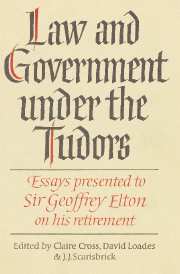Book contents
- Frontmatter
- Contents
- List of contributors
- Preface
- Abbreviations
- Wolsey and the Parliament of 1523
- The Act of Appeals and the English reformation
- Thomas Cromwell and the ‘brethren’
- Henry VIII and the dissolution of the Secular Colleges
- God's law and man's: Stephen Gardiner and the problem of loyalty
- Bondmen under the Tudors
- Wales and England after the Tudor ‘union’: Crown, principality and parliament, 1543–1624
- Robe and sword in the conquest of Ireland
- The principal secretaries in the reign of Edward VI: reflections on their office and archive
- Philip II and the government of England
- Sin and society: the northern high commission and the northern gentry in the reign of Elizabeth I
- The crown, the gentry and London: the enforcement of proclamation, 1596–1640
- Taxation and the political limits of the Tudor state
- Bibliography of the writings of G. R. Elton, 1946–1986
- Index
Robe and sword in the conquest of Ireland
Published online by Cambridge University Press: 06 July 2010
- Frontmatter
- Contents
- List of contributors
- Preface
- Abbreviations
- Wolsey and the Parliament of 1523
- The Act of Appeals and the English reformation
- Thomas Cromwell and the ‘brethren’
- Henry VIII and the dissolution of the Secular Colleges
- God's law and man's: Stephen Gardiner and the problem of loyalty
- Bondmen under the Tudors
- Wales and England after the Tudor ‘union’: Crown, principality and parliament, 1543–1624
- Robe and sword in the conquest of Ireland
- The principal secretaries in the reign of Edward VI: reflections on their office and archive
- Philip II and the government of England
- Sin and society: the northern high commission and the northern gentry in the reign of Elizabeth I
- The crown, the gentry and London: the enforcement of proclamation, 1596–1640
- Taxation and the political limits of the Tudor state
- Bibliography of the writings of G. R. Elton, 1946–1986
- Index
Summary
Historians have recently discovered that the Tudor conquest of Ireland has an intellectual as well as a political history. They are currently discovering that the one is no less problematical than the other. Over the past fifteen years a debate has developed about the mental world occupied by the Elizabethan conquistadores, and the debate has now come to focus on the best-known, as also the most notorious, of the political treatises generated by the conquest, Edmund Spenser's A View of the Present State of Ireland. What follows is an attempt to address that debate. By situating Spenser's text in the context of the literature of the conquest it aims to illuminate the outlook that informs it as well as the ethos from which it emanated. The interpretative key will be found to lie in attitudes to law and government.
Something must be said before proceeding about the strategy of analysis that will be adopted towards the voluminous literature of which Spenser's treatise forms part. A previous exercise in comparative analysis adopted a schematic approach, attempting to relate A View thematically to the entire corpus of reform commentary generated in the final decades of the Elizabethan conquest and pursuing the survey into the era of consolidation under the Stuarts. The purpose was to demonstrate that A View classically formulates the ideological paradigm which the New English colonists had come to devise in order to conceptualise and legitimise the political order being created by the conquest. However brave the attempt and however perceptive, in some respects, the reading of Spenser's text that was offered, the exercise in comparative analysis can be seen to have foundered.
- Type
- Chapter
- Information
- Law and Government under the TudorsEssays Presented to Sir Geoffrey Elton, pp. 139 - 162Publisher: Cambridge University PressPrint publication year: 1988
- 6
- Cited by

